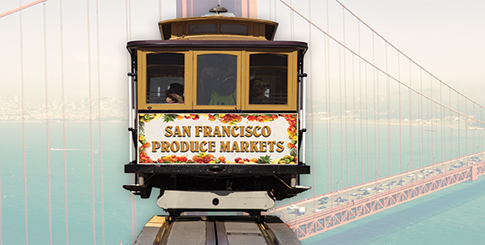A number of merchants have grown into niche or specialty suppliers to ensure their piece of the market and meet specific customer needs. “We deal with restaurants only,” explains Ric Tombari, president and CEO of Cooks Company Produce. “Our customers describe us as a hybrid between a farmers’ market and a produce company because we’ve built up a group of about 200 to 300 family farms that we buy from to curate our product lines.” Cooks Company services hundreds of area restaurants, six days a week, with “34 trucks and no sales people—our drivers act as sort of ‘green grocers’—advising customers on what’s fresh, new, in season, and recommending products.”
Robert Lichtenberg, director of purchasing for Earl’s Organic Produce, says, “We’re the only 100-percent organic distributor on the market. We recently moved into a larger space (a 33,000-square-foot facility) with triple-racked cooler spaces. As a region, San Francisco is booming, and most any business that deals with food does something with organics these days.”
Lichtenberg says that while it’s true the price of organics has come down some in the last decade, the real driver for the trend is lifestyle. “I believe people who are committed to buying and eating organic food do not do so because of price. While there’s a segment that shops price, more and more buying is driven by what people are putting into their bodies, how they prefer to see food grown, and the impact on the environment, farm workers, water, and soil.”
Even the full-service houses cater to more of a niche market in today’s environment. “We’re like a wholesale house used to be,” shares Phil Franzella, president of Franzella Produce, Inc. “At one time or another we’ve handled almost every item; we have shippers and some farmers. While business has been steady for the last three years, it has changed a lot: more people are going direct; you now have Costco, Walgreens, and Target selling produce; and there are more farmers’ markets popping up everywhere.” Further, he explains, distributors like Sysco are buying produce companies too, and some retail outfits are also selling wholesale.
Other former wholesalers got tired of the changes and found another path. Bob Boyajian, president and senior buyer at Integrated Trade Services, Inc., left the terminal markets 16 years ago to serve high-end independent retailers. In the Bay Area, he says local is a big deal for retail buyers, with less demand for bulk items and more for specialty products. “When I got into Hispanic stores, at first, I had to modify prices, but after a few years,” he notes, “they wanted higher quality.”
Whether in the high-end independent retail shops or back at the terminals, at least in San Francisco, quality is key factor in success. Shasta Produce, with stalls in each of the three markets, sees competition, innovation and novelty as the drivers of business.
“We realize the value of a wholesale market, of being right on the street and being with the produce every single day,” shares David Andrighetto, CEO of Shasta Produce. “What’s great about San Francisco is that it has an amazing culinary community and very high standards.” Other markets may welcome lower-priced produce items, he says, “but up here they won’t sell.”



